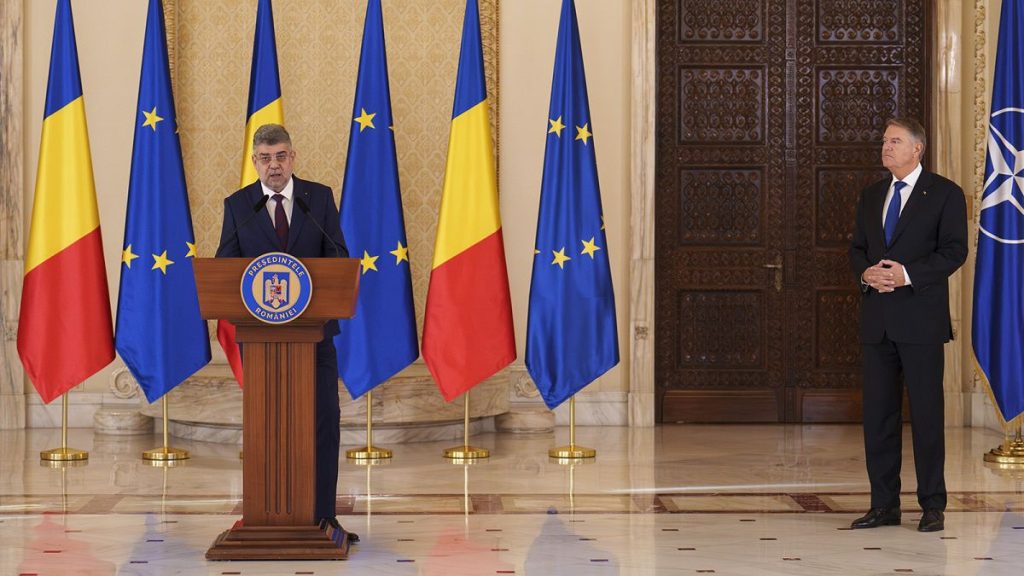Romania finds itself at a critical juncture, grappling with political instability following a tumultuous presidential election marred by controversy and the rise of far-right nationalism. The Constitutional Court’s unprecedented annulment of the presidential race, prompted by allegations of electoral violations and foreign interference, has underscored the fragility of the democratic process and the urgent need for a stable, pro-European government. In response to this crisis, President Klaus Iohannis has nominated incumbent Prime Minister Marcel Ciolacu to form a new coalition government, a move aimed at restoring political equilibrium and reaffirming Romania’s commitment to European integration. Ciolacu, leader of the leftist Social Democratic Party (PSD), faces the daunting task of navigating a complex political landscape and rebuilding public trust eroded by the recent electoral turmoil.
Ciolacu’s nomination signifies a strategic maneuver to counter the growing influence of far-right nationalists who made substantial gains in the December parliamentary elections, reflecting a surge in anti-establishment sentiment. The surprise first-round victory of Calin Georgescu, an ultranationalist outsider, in the presidential election sent shockwaves through the political system and exposed deep societal divisions. The allegations of electoral irregularities and potential Russian interference, including reports of a coordinated disinformation campaign on social media platforms like TikTok, further amplified concerns about the integrity of the electoral process and the vulnerability of Romanian democracy to external manipulation. The annulment of the presidential race underscores the gravity of these concerns and the determination of Romanian authorities to uphold the principles of free and fair elections.
The proposed coalition government, spearheaded by Ciolacu’s PSD, is expected to comprise a diverse range of political forces, including the center-right National Liberal Party (PNL), the ethnic Hungarian party UDMR, and representatives of national minorities. This broad coalition reflects a concerted effort to build a unified front against the rising tide of far-right nationalism and to reaffirm Romania’s commitment to European values and integration. The coalition partners have also agreed on a joint pro-European candidate for the rerun of the presidential election, signaling a shared commitment to maintaining Romania’s close ties with the European Union and resisting the allure of nationalist and populist rhetoric.
The formation of this coalition government marks a renewed attempt to forge a stable and effective governing alliance between the PSD and the PNL, two parties that have historically been political rivals. A similar coalition, also including the UDMR, was formed in 2021 but ultimately collapsed last year due to internal power struggles and policy disagreements. The current political climate, however, necessitates a pragmatic approach to governance, putting aside past differences to address the pressing challenges confronting the nation. Ciolacu acknowledges the difficult path ahead, recognizing the deep political crisis and the erosion of public trust. He has pledged to prioritize restoring public confidence in the government and addressing the concerns that have fueled the rise of anti-establishment sentiment.
The success of this new coalition government hinges on its ability to navigate the complex political landscape, address the underlying causes of public discontent, and deliver on its promises of stability and pro-European governance. The parliamentary approval of Ciolacu’s nomination is a crucial first step, followed by the daunting task of forming a cohesive and effective government capable of tackling the numerous challenges facing Romania. The rerun of the presidential election will be a further test of the coalition’s strength and its ability to unite the country against the forces of extremism and division.
Ultimately, the future of Romania’s political landscape depends on the ability of its leaders to bridge the divides that have emerged in recent years, restore public trust in the democratic process, and reaffirm the country’s commitment to European integration. The challenges are significant, but the formation of this new coalition government represents a crucial step towards achieving those goals and ensuring a stable and prosperous future for Romania. The international community will be closely watching the developments in Romania, as the country’s political trajectory has implications not only for its own future but also for the broader stability and security of the region.

